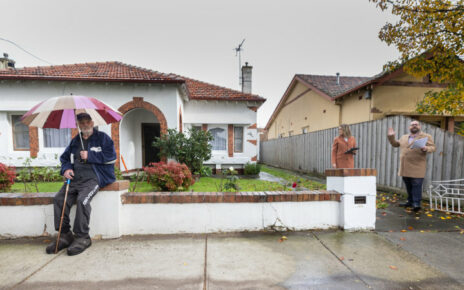As a proud feminist, I still believe that marrying before starting a family is best for children AND for women, writes Louise Perry
For any woman in a loving relationship thinking of having a child out of wedlock, there is one question I feel impelled to ask.
If a man isn’t willing to stand up in front of everyone you and he knows and promise to cherish you for ever, then how can you be sure he’s really committed to your shared life and to that child?
I know such a view — outdated in the eyes of many — will invite ridicule from predictable quarters for whom the institution of marriage may be more or less dead.
Many feminists, for instance, regard marriage as oppressive to women, and are glad to see its decline.
But I take a different view. As a young married mother — and a feminist — I think marriage and civil partnerships serve to better protect both women and children, providing the best possible foundation for building a family.
Banned
If a couple don’t have children for whatever reason, it can be a celebration of a couple’s love — a cherry on the top of the cake, but less essential.
But when children are involved, a marriage takes on an entirely different character.
Why is this important now? Because as the Mail reported this week, last year, for the first time since records began in 1845, a majority of babies were born out of wedlock in the UK.
Perhaps, given that weddings were effectively banned for long periods during the pandemic, we shouldn’t be surprised to discover that some couples decided to delay getting married but to go ahead with starting a family. But it would be wrong to say Covid was solely to blame.

More babies were born outside of marriage in England and Wales last year than to wedded couples for the first time on record, official figures show (stock image)
These figures are part of a long-standing and worrying trend. In the decade following the 1969 Divorce Reform Act, the divorce rate trebled and kept rising, peaking in the 1980s.
Since then there has been a slight decline in the rate, but not because of a return to marital longevity. You can’t get divorced if you don’t first get married, and marriage rates are at a historic low.
Which is a tragedy because the research is overwhelming on this point. Families come in all shapes and sizes, and that is something to truly celebrate. But we know that children brought up in households with two married parents (or parents in a civil union) do far better than other children.

The latest Office for National Statistics data shows around 625,000 live births were logged in the two nations in 2021. But 321,000 of these were outside of marriage or a civil partnership, while 304,000 were within one
Fatherlessness is associated with higher prison rates, higher rates of teen pregnancy and a greater likelihood of emotional and behavioural problems for both sexes.
In the year after a first baby is born, a fifth of couples break up, with unmarried couples much more likely to split. Having a baby is tough — as I have discovered. Exhaustion and anxiety often lead to bickering between new mums and dads, and sometimes separating can feel like the easiest option.
It’s during those difficult moments that being married can make all the difference. Even if the no-fault divorce laws introduced in April have made wriggling out of a marriage easier than wriggling out of a bank loan, there are still psychological factors at play.
When you’ve stood in front of other people — be it a large or small congregation in a church, a couple of witnesses in a register office or on a Caribbean beach if you must — you have made a solemn promise to another person. And the fear of publicly breaking that promise can be enough to make a couple pause.
The grass is not always greener on the other side of the divorce courts. Up to half of divorced people in the UK report in surveys that they regret it.
Divorced women are particularly likely to struggle to find another partner, often remaining single. And if there are children . . . well it is all so much harder.
The single parents I know are the first to point out that doing it alone is tough. Too often — and even if an ex is actively involved in the care of the family — it is one person having to take on the role of both parents disproportionately: the responsibility for nurturing, socialising and disciplining your children.
Of course, money helps. But in the UK too many single parents — usually mums — are the main breadwinner, too. No wonder half of all children in lone-parent families are in relative poverty. For tens of thousands it is a set-up that doesn’t work.
Meanwhile, life has never been easier for ‘deadbeat dads’ who, once divorced, feel they have no responsibility to their sons and daughters.
The financial burdens of fatherhood are easy enough to avoid. In the UK, less than two-thirds of non-resident parents — almost all of them fathers — are paying child support in full. These men are the unexpected winners from the progressive assault on marriage.
Fripperies
The feminists who condemn marriage as oppressive to women have got it backwards. Given the vulnerability of mothers and children, particularly during the early years, marriage actually serves the interests of women because it makes it more difficult for men to abandon them.
Strip away all of the expensive fripperies of the Big White Wedding, and what a marriage actually consists of is a legal bond between two people and, I would argue although lawyers no doubt would contradict me, any children they may bring up together.
Perversely, however, the expectation of the Big White Wedding is putting some people off marriage altogether. I heard a caller on the radio yesterday explain that he hadn’t yet married his long-term girlfriend because they were worried about the cost.

In the decade following the 1969 Divorce Reform Act, the divorce rate trebled and kept rising, peaking in the 1980s (stock image of a family)
He had proposed many years ago and she was eager to tie the knot. But now they had a baby on the way and didn’t feel they could spare the cash.
A sad predicament and an unnecessary one, because getting married needn’t be expensive. Indeed, there is evidence to suggest that couples who have cheaper weddings are less likely to end up divorcing.
I got married at the age of 25 — an age that was bang on average as recently the 1980s, but is nowadays unusually young. My husband and I weren’t motivated by religion or family pressure. We’d just been together for four years and were both certain that this relationship was a keeper.
Commitment
The event was modestly old-fashioned. We had a church wedding followed by a reception in a marquee set up in a local pub garden. I sourced bunting and other bits and pieces on eBay, made my own dress, as well as the bridesmaids’ dresses, and my cousin baked the cake.
The point of the wedding isn’t about the dress, the presents or enjoying ‘our special day’. It is solely about two people making a public commitment to each other.
Personally, I don’t like the new vogue for couples to write their own vows, and not only because the results are often toe-curlingly mawkish.
Every time my husband and I go to a traditional C of E wedding, we hear again the words we spoke at our own wedding, and are reminded that we’ve opted into an institution that every other married couple is part of.
The institution of marriage isn’t perfect. It’s restrictive and clunky and sometimes uncomfortable. But it works far better than any other system we’ve yet come up with.
- Louise Perry is author of The Case Against The Sexual Revolution: A New Guide To Sex In The 21st Century.
Source: Read Full Article


